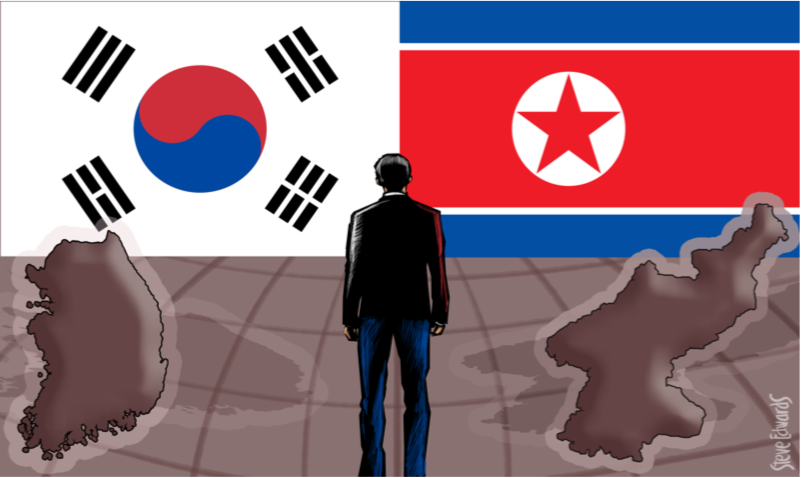An uncomfortable article to write
Opinion
By Jin Lee

When the GJR editor asked me to write an article about South Korea, Trump, and North Korea, a strange feeling occupied me, which I could not articulate in words. It was discomfort.
In fact, I’ve often felt this way when people ask me, “Is your country safe?” and “Have you ever really met any person from North Korea?” after they know my national identity as South Korean, or when people recently say “We’ve got your back. Don’t worry,” referring to nuclear threats from North Korea.
One question has recently been added to that list of frequently asked questions: “Do South Koreans and their media like Trump?”
As a South Korean, I am not comfortable talking about North Koreans’ or South Koreans’ opinions about Trump. I think such North Korean issues are not U.S.-related political issues; rather, they are Korean issues where the U.S. constantly has interfered. Or precisely speaking, now they seemingly became U.S. issues that were supposed to be issues between two Koreas for the sake of their own citizens. However, in the wake of so much news coverage of North Korea, South Korea has become invisible. Since Trump has become president, everything seems to have turned into a constant ping-pong match between Trump and North Korean leader Kim Jong-un.
Thus, South Koreans have become indifferent to North Korea’s threat, as it no longer is the South’s problem. But at the same time, South Korean government and media worry about “Korea Passing” in international politics. This term refers to countries overlooking South Korea in political debates on Northern East Asia region, not least Korean Peninsula.
Since Trump’s inauguration, he has pushed South Korea aside, directly talking with China and Japan about North Korea, while South Korea President Moon Jae-in clearly said, “No one should be allowed to decide on a military action on the Korean Peninsula without South Korean agreement.”
U.S. media organizations, including the “world-leading” news companies like New York Times, CNN, are not free from critiques for “Korea Passing” in their coverage. Thus, I am upset as North Korea is frequently covered in English for English speakers without mentioning both Koreans. Too, I am unhappy both the U.S, and its media see the U.S. as the world’s policeman. The U.S.’s involvement in South Korean issues or Korean Peninsula, including Trump’s comments on North Korea, is a very unnecessary colonial practice.
In the name of the global police, the U.S. has sold vast amounts of cheap, old weapons at inflated prices to S. Korea, provoking unnecessary tension on the Peninsula. Furthermore, the U.S.’s stated desire for peace on the Peninsula is very incomprehensible as it ignores the fact that Korea’s sudden division into two Koreas is attributed to the U.S.’s attempt to stop the expansion of the USSR-Chinese alliance during the Cold War.
Stopping an enemy’s leverage in a third-party country’s territory closely mirrors what two empires — Great Britain and France — did when they colonized Africa. We should never forget, the continuously occurring cruel genocide and wars between different tribes in Africa, in fact, originate from Two empire’s colonial practice and diplomatic negotiation — results of the uncareful and ignorant borderline-drawing for their sake, not considering how a region is divided by different tribes, ethnicities, and culture in Africa.
So why might U.S. people find it “interesting” for me to link North Korea and Trump? For instance, people’s questioning one exemplary question, “how South Korean media look at Trump’s visit?” to me ironically coincides with the ways of exercising U.S. hegemony regarding issues happening in the “other/subaltern” region. South Korean media report about Trump’s visit since he always threatens us: “If you do not buy our weapons we will seriously re-consider the Free Trade Accord.” And there is pressure, as South Korean media report, to make Samsung establish more factories in the U.S. to bolster American jobs and productivity.
But when I mention these to explain in the current situation of South Korea, I see U.S. people lose their interest, saying “I don’t understand. We [U.S.] are not No.1 country anymore. China has taken that position many years ago. So we also need to take our benefit as much as we can from FTAs, stop spending money on the military.” Then they go, “But no worry. We also care about you, we’ve got your back. Kim Jong-un…[sigh].” As many in the “subaltern” have pointed out, the dominant with power do not acknowledge they are exercising power.
Questions such as “What do South Koreans think of Trump?” or “How do the South Korean media portray Trump’s visit” do not truly ask South Koreans’ perspective. Rather, they arise from the interest of U.S. people; whether Trump is welcomed or looked down upon in other countries, whether he can manage political issues happening in the “subaltern” (including North Korea) during his visits, whether he is competitive or better than the China’s Xi Jinping who is rising as an alternative global leader. All these questions assume the U.S. is the global leader.
But as a South Korean, I question why America should be involved in our issues. Why do we need another leader from another country than ourselves? Why do we need No.1 country anyway? And why should the U.S. be the leader?
Since coming to the U.S. in 2014, I can provide answers that suit the interest of U.S. people, making fun of “Rocketman” or pitying North Koreans, although I do not know anything about how real North Koreans are living. But I also feel frustrated and sometimes guilty, saying this is what South Korean say since I confess that they are not what South Koreans say, but rather simply reflect what the U.S. wants to see from South Korea.
An “excessive” interest to another country, but limited to a very specified topic, is now shown in South Korean media. One North Korean soldier was shot by North Korean troops as he defected to South Korea across the DMZ. Although he was successful at escaping, he was seriously injured and moved to a hospital for surgery. What surprised South Korean media was not his identities, but his inside.
In an abdominal operation, dozens of parasitic worms, some 11 inches long, were found in his stomach. Instead of covering the tension between two Koreas that may be heightened from the escape, South Korean media thus are repeatedly producing stories highlighting hygiene problems and malnutrition in North Korea. In the second briefing after surgery, even the doctor asked South Korean media to stop producing misinformation about the worms or his status, but rather to focus on more important topics, including budget cuts and security issues in DMZ. When the doctor mentioned those issues, not conforming to conventions of portraying poor life qualities in North Korea, all news agencies here stopped live broadcasting the briefing, quickly returned to their newsrooms and continued their “worms” reporting.
Such a scene is familiar to me. When I confess my indifference toward North Korea and criticize the U.S. hegemony, U.S. people seem flustered and suddenly the conversation ceases. But I wonder: Why do you care about North Korea? And must the U.S. be the world’s evangelist — its military and media?

